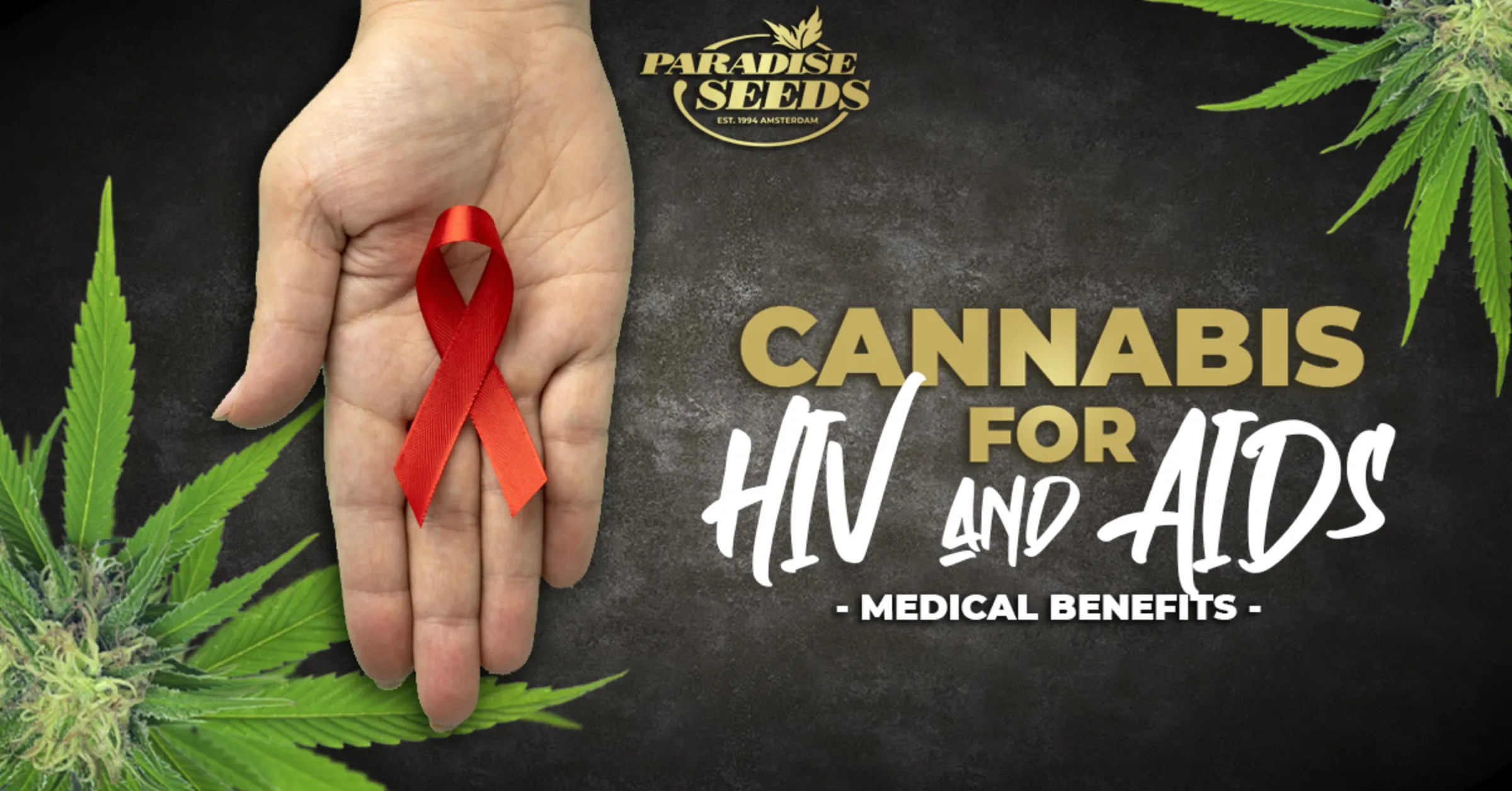What are the benefits of medical cannabis for HIV and AIDS patients? It is suggested that the proportion of cannabis use by HIV patients is far higher than the rest of the population (1) – this is not a coincidence as the evidence shows that cannabis is helping them. There have been many studies that look at how cannabis can help people living with HIV and, given the scale of global infection, cannabis could assist millions of these patients.
Compared with the 1990s, HIV does not grab the news headlines like it used to but, in 2019, 38 million people were living with the disease, of whom 19% (7.1 million) did not know their status (2). The first case of HIV was identified back in 1959 and by the 1980s cases were rising sharply. Since the epidemic began, 75.7 million people have become infected and 32.7 million of those have died. Although the number of deaths peaked in 2004, with 1.7 million deaths, 690,000 died in 2019.
Every day about 4,500 people are infected with HIV, with most cases located in low- to middle-income countries; sub-Saharan Africa makes up 59% of infections. Groups that are politically easier to ignore still make up the key affected populations, for example, sex workers, p eople who inject drugs, prisoners, transgender people, gay men and other men who have sex with men. Moreover, women are more affected than men (3).
Cannabis Use to Relieve HIV Symptoms
In 1987, the first treatments for HIV were introduced but it was not until 1996 that they had developed sufficiently to be effective. During that time – especially in San Francisco – the benefits related to the use of cannabis by HIV patients began to circulate through anecdotal reports.
Globally, less than 70% of those living with HIV are receiving these antiretroviral treatments ( ART ) that stop the virus replicating in the body, thus allowing the immune system to repair itself and prevent further damage . Even though they have reduced the mortality rate, there are many adverse side effects to these medication regimes. While cannabis does not directly treat the infection, it is useful in supporting patients with a range of symptoms and providing relief to adverse effects of ART.
Which symptoms of HIV is cannabis helpful for?
Studies have found that symptom control using cannabis is widespread with patients reporting improved appetite and reduction in muscle pain, nausea, anxiety, nerve pain, depression, and paraesthesia (pins and needles). (4)
A key contribution of using medical cannabis for people living with HIV is for the purpose of pain management (5). HIV causes inflammation of nerves because of the increased activity of active monocytes (a type of white blood cell), but research has shown that cannabis can reduce the number of these monocytes (6). Inflammation in HIV patients has serious consequences because it can lead to myocardial infarction (a heart attack), neurocognitive impairment and death so the anti-inflammatory properties of cannabis may provide a beneficial intervention to reduce morbidity (7).
Cannabis’ effect on other HIV medications
The use of illicit drugs has been associated with deterioration of HIV treatment so the contribution of cannabis in this situation is important to study, yet, rather than be part of the problem, cannabis is proving to be part of the solution (8). Although cannabis remains illegal in many places, unlike other ‘illegal’ drugs, it does not appear to reduce the effectiveness of medications. On the contrary, it is associated with reduced consumption of prescription and illicit drugs for pain, particularly opiates (9).
Thus, at a basic level, the use of cannabis diverts patients from other drugs that will worsen their condition. One factor in the poor outcomes associated with illicit and prescription drug use is that patients have trouble sticking to the medication regime of ART but cannabis users are, actually, more likely to adhere to taking ART than other groups (10).
Cannabis supports ART in other ways too. The suppression of viral load, the amount of HIV in the body, is one of the most important factors in treatment. Cannabis use has been found to increase the suppression effect (11). The decay in HIV DNA that is one aim of ART occurs more quickly in patients that use cannabis and it is associated with reduced systemic inflammation (12).
Cannabis’ role in the future of HIV and AIDS treatment
Cannabis could become a key partner in the treatment plans for people living with HIV. Because the numbers of people affected by this disease are so high, this is an area where the properties of cannabis could provide a vital global response to one of the most destructive infections in the last 100 years. Whether those treatments are in the form of CBD oils or THC extracts is yet to emerge, but what is clear is that research into cannabis is opening pathways to improve the health of millions.
References
- Shiau S, Arpadi SM, Yin MT, Martins SS. Patterns of drug use and HIV infection among adults in a nationally representative sample. Addict Behav. 2017;68:39–44. 10.1016/j.addbeh.2017.01.015
- Montgomery, LaTrice, Kara Bagot, Jennifer L. Brown, and Angela M. Haeny. 2019. The Association Between Marijuana Use and HIV Continuum of Care Outcomes: a Systematic Review. Current HIV/AIDS reports 16 (1):17-28.
- https://aidsinfo.unaids.org
- https://www.avert.org/global-HIV-and-aids-statistics#footnote1_bwryhqw
- Woolridge, E., Barton, S., Samuel, J., Osorio, J., Dougherty, A. and Holdcroft, A., 2005. Cannabis use in HIV for pain and other medical symptoms. Journal of pain and symptom management, 29(4), pp.358-367. https://www.sciencedirect.com/science/article/pii/S0885392405000631/
- Chayama KL, Valleriani J, Ng C, Haines-Saah R, Capler R, Milloy MJ, Small W, McNeil R. The role of cannabis in pain management among people living with HIV who use drugs: A qualitative study. Drug Alcohol Rev. 2021 Nov;40(7):1325-1333. doi: 10.1111/dar.13294.
- https://www.ncbi.nlm.nih.gov/
- Rizzo, Michael D; Crawford, Robert B.b,c; Henriquez, Joseph E.; Aldhamen, Yasser A; Gulick, Petere; Amalfitano, Andread,; Kaminski, Norbert E.b,c HIV-infected cannabis users have lower circulating CD16+ monocytes and IFN-γ-inducible protein 10 levels compared with non-using HIV patients, AIDS: February 20, 2018 – Volume 32 – Issue 4 – p 419-429
- doi: 10.1097/QAD.0000000000001704
- https://journals.lww.com/aidsonline/fulltext/2018/02200/HIV_infected_cannabis_users_have_lower_circulating.2.aspx
- Ellis, Ronald J., Natalie Wilson, and Scott Peterson. 2021. Cannabis and Inflammation in HIV: A Review of Human and Animal Studies. Viruses 13 (8):1521.
- https://www.ncbi.nlm.nih.gov/
- Lucas GM, Cheever LW, Chaisson RE, Moore RD. Detrimental effects of continued illicit drug use on the treatment of HIV-1 infection. Journal of Acquired Immune Deficiency Syndromes (1999). 2001 Jul;27(3):251-259. DOI: 10.1097/00126334-200107010-00006.
- https://europepmc.org/article/med/11464144
- Sohler NL, Starrels JL, Khalid L, Bachhuber MA, Arnsten JH, Nahvi S, Jost J, Cunningham CO. Cannabis Use is Associated with Lower Odds of Prescription Opioid Analgesic Use Among HIV-Infected Individuals with Chronic Pain. Subst Use Misuse. 2018 Aug 24;53(10):1602-1607. doi: 10.1080/10826084.2017.1416408.
- https://www.ncbi.nlm.nih.gov/
- Montgomery, LaTrice, Kara Bagot, Jennifer L. Brown, and Angela M. Haeny. 2019. The Association Between Marijuana Use and HIV Continuum of Care Outcomes: a Systematic Review. Current HIV/AIDS reports 16 (1):17-28. https://www.ncbi.nlm.nih.gov/pmc/articles/PMC6432787/
- Milloy, M.J., Marshall, B., Kerr, T., Richardson, L., Hogg, R., Guillemi, S., Montaner, J.S. and Wood, E., 2015. High ‐ intensity cannabis use associated with lower plasma human immunodeficiency virus ‐ 1 RNA viral load among recently infected people who use injection drugs. Drug and alcohol review , 34 (2), pp.135-140.
- https://onlinelibrary.wiley.com/doi/abs/10.1111/dar.12223
- Antoine Chaillon, Masato Nakazawa, Christy Anderson, Aaron Christensen-Quick, Ronald J Ellis, Donald Franklin, Sheldon R Morris, Sara Gianella, Effect of Cannabis Use on Human Immunodeficiency Virus DNA During Suppressive Antiretroviral Therapy, Clinical Infectious Diseases , Volume 70, Issue 1, 1 January 2020, Pages 140–143, https://doi.org/10.1093/cid/ciz387
- https://academic.oup.com/cid/article/70/1/140/5487786/


